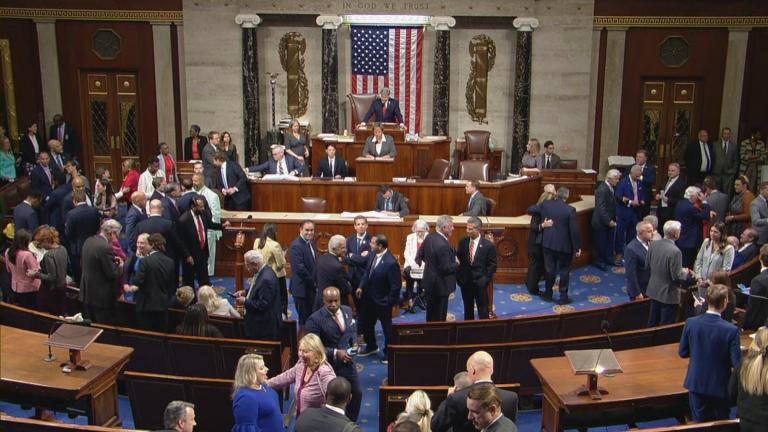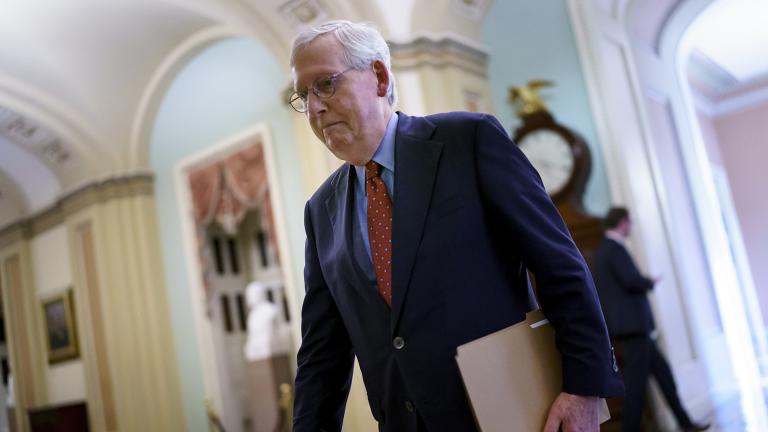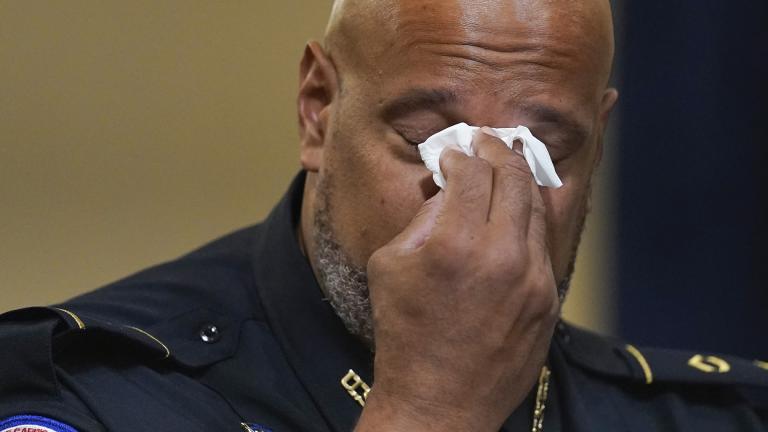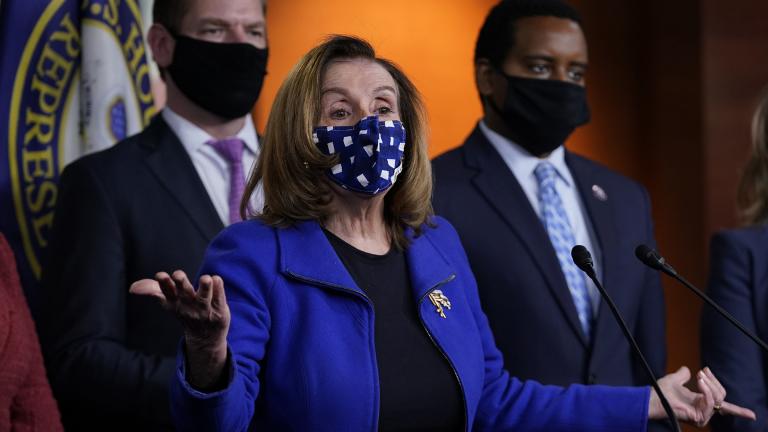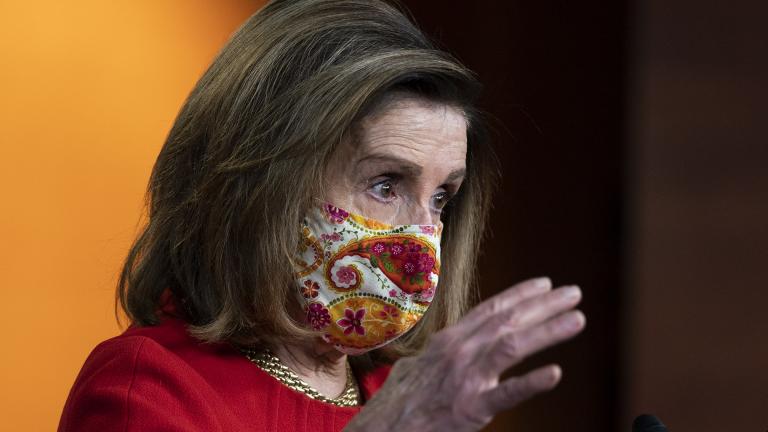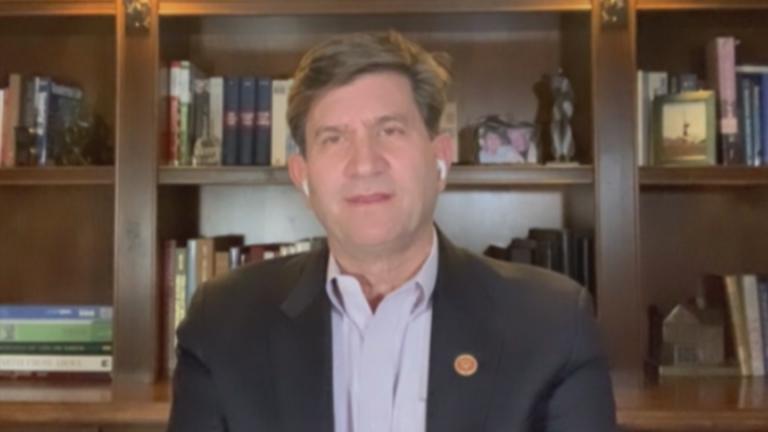 Members of the U.S. House of Representatives on the floor. (WTTW News)
Members of the U.S. House of Representatives on the floor. (WTTW News)
It’s been more than 250 days since Hamas’ Oct. 7 ambush attack on Israel — the deadliest in Israeli history, precipitating Israel’s retaliatory offensive in Gaza that’s estimated to have killed more than 35,000 people.
The U.N. Security Council on Monday approved a U.S.-sponsored resolution in support of President Joe Biden’s three-phase proposal for a cease-fire, but the plan has so far not come to fruition. The U.S. claims Hamas — the Islamic militant group (classified as a terrorist organization by the U.S.) that governs the Palestinian Authority’s Gaza strip — is seeking changes.
U.S. Rep. Brad Schneider, who represents Illinois’ 10th District including Chicago’s northernmost suburbs up to the Wisconsin state line, said that at some point, the conflict will end.
He’s an organizer of a bipartisan, bicameral working group that’s exploring what happens then. As a news release announcing its formation framed it, the Gaza Working Group will “plan for the ‘day after’ in Gaza once Hamas is defeated.”
“The most extraordinary points in history … are when there are crossroads,” Schneider said. “And we are at a crossroads. We are at a moment where the possibility of changing the future of the Middle East for the better is in front of us: Saudi Arabia, willing to and wanting to normalize relations with Israel; the Abraham Accords laying the foundation for those possibilities; the ability to defeat Hamas … to give the people of Gaza a hope for a positive future, a better future. All that’s in front of us. And I pray to God that we don’t lose that moment. Because the alternative … if we don’t grasp this moment, could be very dark. So I hope that we do everything we can to make sure we take the right path here.”
Schneider was scheduled to be in Israel the week of Oct. 7 to speak at a conference for the N7 Initiative — dedicated to developing relationships, scholarships and “regional integration between Israel and Arab and Muslim countries” — but he backed out of the trip prior to the attack due to personal reasons.
The Democratic congressman, who is Jewish, said the group is a new extension of the Abraham Accords Caucus, another bipartisan group of federal legislators launched in 2022 after the U.S. mediated agreements between Israel and Bahrain, Morocco, the United Arab Emirates and Sudan in which signatories agreed to “encourage efforts to promote interfaith and intercultural dialogue to advance a culture of peace among the three Abrahamic religions and all humanity.”
Schneider said the caucus helped to pass the Israel Relations Normalization Act of 2021, defend against Iran’s April 13 missile and rocket launch on Israel, and has met with ambassadors from countries that are signatories to the Abraham Accords.
The Gaza Working Group, he said, will build from that base.
After Hamas took 250 hostages and killed 1,200 Israelis, Schneider said, “it became very clear very quickly that the future in Gaza depended on Hamas no longer being able to reign terror over Gaza or threaten Israel, but that there had to be a future for Gaza. That’s where I had the idea for putting together a working group within the construct of the Abraham Accords Caucus.”
Members of the working group had their first meeting last week met with Israeli Ambassador to the U.S. Michael Herzog.
Schneider talked with WTTW News about the Gaza Working Group this week. Below is an excerpt of the interview, which has been edited for clarity and length.
WTTW News: You’ve stressed the bipartisanship of the working group, but given polarization in Washington, is there hope for a bipartisan consensus or action?
Brad Schneider: It is a hyper-partisan moment in our country’s history. Too many people are screaming and yelling at the top of their lungs rather than rolling up their sleeves to get things done. Which is why I’m proud of my work not just with the Abraham Accords Caucus, but Problem Solvers, other groups we’re really trying to make a difference. I can point to a couple of months ago when we passed … in our national security interest, the essential aid bills for Ukraine, Israel and Taiwan. Those bills passed.
Ukraine’s bill had 311 votes, Israel got 366, Taiwan 385 votes. Those are overwhelming bipartisan majorities. Both sides of the aisle working together recognizing that we can get this done. I think the partisanship meant that it took six months to go from the original draft legislation to getting that same legislation passed this spring. It should have been done long ago. The partnership delayed, but it didn’t deny that ability to do what had to be done.
The release announcing the working groups launch talks about aspirations for Gaza ‘once Hamas is defeated.’ Is it a certainly that Hamas will be defeated?
Schneider: It has to be a certainty. The Palestinians won’t know peace, there won’t be security for Israel, as long as Hamas can reign terror over Gaza and threaten Israel. So we saw on Oct. 7, what a unrestrained Hamas is capable of doing. Hamas has told the world time and again that they will do it over and over and over.
That’s not my words. That’s their words. And so Hamas cannot be allowed to continue to govern Gaza or to threaten Israel. There is not just recognition within Israel for that fact, but our allies in the region are saying the same thing, our European allies are saying the same thing. Ultimately, Hamas could end the war tomorrow by releasing hostages and laying down their arms. We saw with this current response (to the proposed cease-fire deal), that (Yahya) Sinwar, who is leader of Hamas inside Gaza, is more willing to let the people he supposedly represents suffer than he is to seek a path that will provide relief to his people and peace for the region.
What’s your opinion of the proposed cease-fire framework?
Schneider: My opinion is what President (Joe) Biden presented to the world now almost two and a half weeks ago now, very clearly said: There is a pathway to a cease-fire, a release of the hostages and an end of the conflict that will bring recovery or the opportunity of recovery for the people of Gaza. It’s in Hamas’ court. Hamas had a chance to accept it. They chose not to. I hope they (re)consider that decision. It’s not just Israel that has made this offer. The U.S. has presented it and stood by it, Egypt and Qatar, you have the (United Nations) Security Council even pass the resolution calling on Hamas to take the steps and to accept the offer.
Does a cease-fire on the table change the domestic politics of the moment, with national protests — including in Chicago — calling for an end to war in Gaza and a belief by protestors that Israel is in the wrong?
Schneider: I’ll point to the protest we saw — the horrific protest we saw — in New York earlier this week, where they were protesting outside a memorial exhibit for the massacre at the Nova music festival in which 360, mostly young Israelis celebrating a music festival for peace, were massacred. There were chants there (at the New York protest) of genocide, chants of ‘kill Zionists.’ It was just outrageous.
There are people who are calling for cease-fire on both sides, who are saying this fighting in Gaza has to end. It ends when Hamas decides to release the hostages and lay down its arms. And both sides want that. There are also people who are out protesting because they want to see the destruction of Israel; they think Israel doesn’t have a right to exist. And a cease-fire, a peace treaty, the movement of the Abraham Accords, is not going to satisfy those people who want to see the destruction of Israel or the murder of Jews and I’m sure will continue to protest.
Let’s say there is a cease-fire, an end to the war. What is your vision for what happens in Gaza?
Schneider: My vision I think is what is shared by the majority of people in Gaza and in Israel. An opportunity to build their communities. My vision for Gaza is that instead of 500 miles of terrorists’ infrastructure — tunnels underground that are only there to serve Hamas and other terrorist organizations — that the aid and development that’s going to go into Gaza is going to build neighborhoods, with homes, with schools with mosques, with industrial centers that will provide quality jobs.
And that the people of Gaza will be able to achieve the self-determination and aspirations that they have for their children the same way that people in Israel are seeking to do for their children. That Palestinians and Israelis will recognize that they both belong to the same land, that they need to find a way to live together for security and peace, and that that living together of Palestinians and Israelis will extend to the entire region. And the Abraham Accords will become a model for the whole world.
What’s next for the working group? Will it examine possibilities for what’s next for Gaza in terms of who will be in charge and what elections may look like?
Schneider: To be clear, it will not be the United States Congress that will draft the documents, (etc.) … We’re not the deciding factor. What we are is a force that can be used to do good; to support people with good intentions who are pursuing peace; to make sure that aid, assistance, development, security and governance is ultimately going to win the day in Gaza.
And the United States has a critical role, a leadership role — primarily the (president’s) administration, but Congress has a role in supporting that. And so what you’ll see with the working group, we will continue to have conversations with leaders from all the countries in the region, bring in experts, and we’ll look for opportunities where Congress can act, to act not just with determination, but with a sense of urgency that meets that meets the moment.
Contact Amanda Vinicky: @AmandaVinicky | [email protected]

